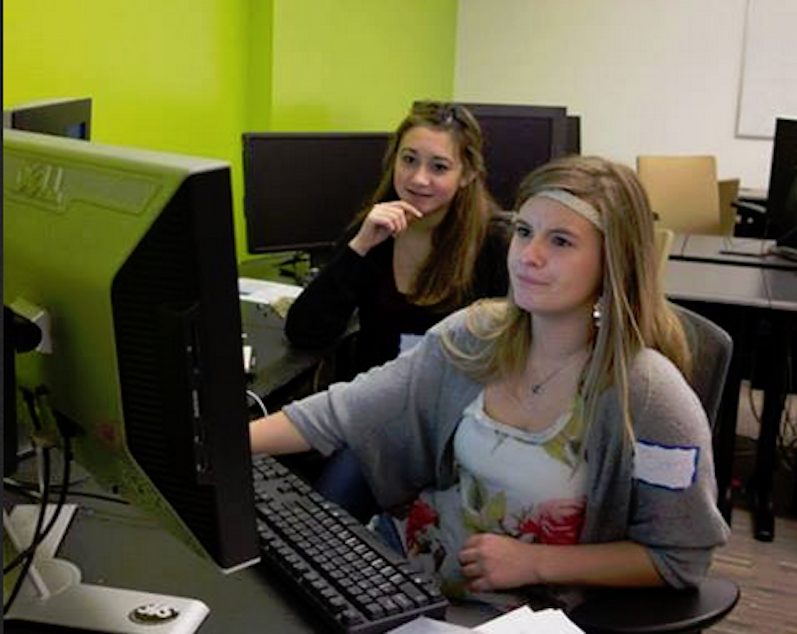Encouraging Girls, Women To Pursue Jobs In Tech

It’s summertime in Seattle, and deep inside a basement classroom of the Paul Allen computer science building at the University of Washington, Justin Bieber is being deconstructed.
It’s not what you might think, though. Teacher Hélène Martin is taking apart Bieber’s digital picture, bit by bit, using a computer programming language called Processing.
The week-long class, part of a program started by the university’s computer science department, teaches teen girls to code. Many of the young women attending this coding camp were encouraged by their parents, teachers or mentors, but most studies show that girls are rarely pushed to pursue programming and tech studies, which means they’re less likely to pursue careers in those fields. According to a recent US Census Bureau study, 80 percent of all tech jobs are held by men.
“One of the things that parents tend to do is they’re much more protective of their daughter’s time online,” said Rane Johnson, a principal research director at Microsoft Research Connections. Johnson said parents want to protect their daughters from the unknown dangers of the Internet.
“And so girls are experiencing gaming or the Internet or computer science or programming a lot less than their brothers,” she said.
Sponsored
You wouldn’t know that looking around the coding camp, though. Genevieve Payzer, 16, is one of the camps team leaders.
“Today we’re doing our own sort of Photoshop,” Payzer said. “Tomorrow we’ll be building a paint program. Yesterday we built Pong, which is a really popular game.”
Elizabeth Brace, 15, said she welcomes the challenge: “I feel like you can be really artistic over the computer, definitely with programming. I’ve walked around when some of us were altering images, and they’re all different in some way.”
As a woman leader in the tech industry, Johnson wants to see more of this enthusiasm — and less fear around math and tech. That’s why she’s creating an online community for middle school girls at the University of Wisconsin–Madison.
Her project uses game design to inspire girls to learn more about computational theory and computer science. To better understand how to break down barriers, she’s conducted focus groups with teens.
Sponsored
“A lot of things that they bring up is, ‘Well, if my friends don’t want to go into a math class, even though I like it, I’m not going to do it,”’ Johnson said.
And beyond high school, at the undergraduate and graduate level, there’s work to do as well, said University of Washington professor Ed Lazowska.
“Last year we graduated 28 percent women from this program — it ought to be, let’s say, 50 percent, so it’s half of what it ought to be,” Lazowska said. “The tragic thing is that we’re double the national average.”
He said the trick is to get women in the door.
“Of the young women who eventually become our majors, 60 percent when they entered the introductory course were not interested becoming a computer science major,” he said. “When they were exposed to a well-taught introductory computer science course, they fell in love with it.”
Sponsored
Career Changers
Not all efforts are focused on girls and young women. A new, Seattle-based software development training program called Ada Developers Academy is recruiting women who want to change careers.
Through social media and word of mouth, the academy has attracted more than 100 applicants from across the country. The academy took in its first class of about 15 women in late October.
Elise Worthy co-founded Ada Developers Academy, started in urban planning, but realized that “municipal park planning is not for me.”
“I really was always sort of technically inclined, but I didn’t have a support network that would have fostered any technical schooling or anything like that,” Worthy said.
Sponsored
The academy is designed to give women six months of intense classroom training in software development. That’s followed by real world experience through an internship in the field.
Susannah Malarkey, executive director of Seattle’s Technology Alliance, which oversees the academy, explained why she believes gender diversity is important.
“If you’re trying to develop a product, and you’ve got both men and women who might be using that product, it makes sense to have a diverse team creating that product,” Malarkey said. “They realize that diverse teams are more productive teams, and they really want more women.”
Because, according to those in the industry, those really great jobs in computer science are solving really big human problems. Like how to cure diabetes and HIV.
Back in the basement of the computer science building, Genevieve Payzer said she’s considering a career in tech.
Sponsored
“I’m not 100 percent set on it, because I’m a junior and I have some time, but I really love it, how it can be used in so many disciplines.”
Which is why, experts say, they need as many different minds as possible, to tackle the problems of the future.

